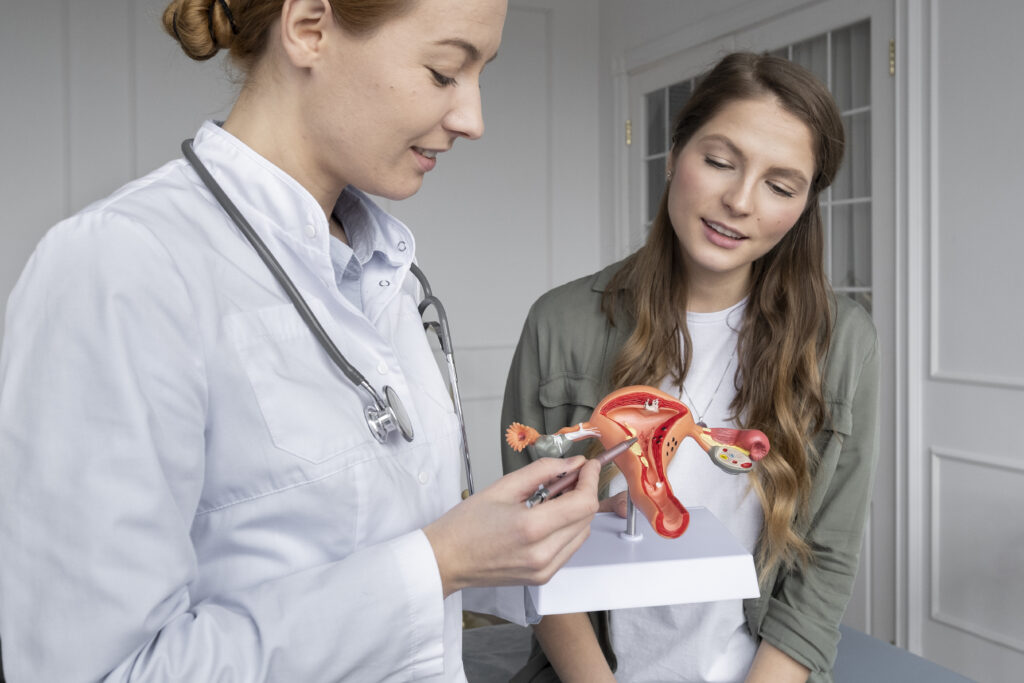PCOS (Polycystic Ovary Syndrome) and PCOD (Polycystic Ovarian Disease) are two terms often used interchangeably to describe a common hormonal disorder that affects women of reproductive age. While they are related conditions, there are some differences in terminology and diagnostic criteria.
PCOS (Polycystic Ovary Syndrome )
Polycystic Ovary Syndrome (PCOS) is a complex hormonal disorder characterized by a combination of symptoms, including irregular menstrual periods, ovarian cysts, and hyperandrogenism (elevated levels of male hormones). It is considered a syndrome, as it involves a cluster of symptoms that vary in severity among affected individuals. In addition to menstrual irregularities and ovarian cysts, common signs and symptoms of PCOS may include:

- Irregular or absent menstrual periods
- Excess hair growth (hirsutism) on the face, chest, back, or abdomen
- Acne or oily skin
- Weight gain or difficulty losing weight, particularly around the abdomen
- Thinning hair or male-pattern baldness
- Darkening of the skin, particularly along the neck creases, groin, and underneath breasts (acanthosis nigricans)
- Insulin resistance or type 2 diabetes
- Infertility or difficulty getting pregnant

PCOD (Polycystic Ovarian Disease)
Polycystic Ovarian Disease (PCOD) is a term used to describe a condition characterized by the presence of multiple cysts on the ovaries. It is often used interchangeably with PCOS, although PCOD may refer specifically to the ovarian aspect of the syndrome without the presence of other associated symptoms. However, in clinical practice, PCOD is generally considered synonymous with PCOS.
Causes of PCOS/PCOD:
The exact cause of PCOS/PCOD is not fully understood, but several factors may contribute to its development:
1. Hormonal Imbalance: PCOS/PCOD is associated with hormonal imbalances, particularly elevated levels of androgens (male hormones) such as testosterone. Insulin resistance, where the body’s cells become less responsive to insulin, can lead to increased androgen production by the ovaries.
2. Genetics: There may be a genetic predisposition to PCOS orPCOD, as it tends to run in families. Certain genetic factors may influence hormone metabolism, insulin sensitivity, and ovarian function, contributing to the development of PCOS/PCOD.
3. Insulin Resistance: Insulin resistance is common in women with PCOS/PCOD and can lead to high insulin levels and compensatory increases in androgen production. Insulin resistance may also contribute to weight gain and difficulty losing weight, which are common features of PCOS/PCOD.
4. Inflammation: Chronic low-grade inflammation may play a role in the development and progression of PCOS/PCOD. Inflammation can disrupt ovarian function, hormone regulation, and insulin sensitivity, contributing to PCOS/PCOD symptoms.
Natural Remedies for PCOS/PCOD:
While there is no cure for PCOS/PCOD, lifestyle modifications and natural remedies can help manage symptoms and improve overall well-being. The following tactics might be helpful:
1. Healthy Diet: Adopting a balanced diet rich in whole foods, fibre, lean proteins, and healthy fats can help regulate blood sugar levels, improve insulin sensitivity, and support hormonal balance. Focus on whole grains, fruits, vegetables, nuts, seeds, and lean sources of protein. Limit processed foods, sugary snacks, and refined carbohydrates.
2. Regular Exercise: Engaging in regular physical activity can help improve insulin sensitivity, promote weight loss or weight maintenance, and reduce symptoms of PCOS/PCOD. Together with cardiovascular activities, try to get in at least 150 minutes of moderate-intensity or 75 minutes of vigorous-intensity activity per fortnight.
3. Stress Management: Chronic stress can exacerbate symptoms of PCOS/PCOD by increasing cortisol levels and disrupting hormonal balance. Practice stress-reducing techniques such as deep breathing, meditation, yoga, tai chi, or progressive muscle relaxation to promote relaxation and well-being.
4. Weight Management: Maintaining a healthy weight through diet and exercise is important for managing PCOS/PCOD symptoms, as excess weight can exacerbate insulin resistance and hormonal imbalances. Aim for gradual and sustainable weight loss if overweight or obese, focusing on lifestyle changes rather than fad diets or extreme measures.

5. Supplements: Certain supplements may help support hormone balance and alleviate symptoms of PCOS/PCOD. These may include:
- Inositol: A type of B-vitamin that may improve insulin sensitivity and menstrual regularity.
- Omega-3 fatty acids: Found in fish oil supplements, omega-3s may reduce inflammation and improve lipid profiles in women with PCOS or PCOD.
- Vitamin D: Low levels of vitamin D are common in women with PCOS/PCOD and may be associated with insulin resistance and hormonal imbalances. Supplementing with vitamin D may help improve symptoms.
6. Herbal Remedies: Some herbal remedies may have beneficial effects on hormone balance and menstrual regularity. These may include:
- Cinnamon: Known for its insulin-sensitizing properties, cinnamon may help improve insulin sensitivity and regulate menstrual cycles in women with PCOS/PCOD.
- Spearmint tea: Spearmint tea has been studied for its anti-androgenic effects and may help reduce hirsutism (excess hair growth) in women with PCOS/PCOD.
- Saw palmetto: This herb may help reduce symptoms of PCOS/PCOD by blocking the conversion of testosterone to its more potent form, dihydrotestosterone (DHT).
7. Regular Monitoring: Women with PCOS/PCOD should have regular check-ups with their healthcare providers to monitor symptoms, assess hormone levels, and address any complications or concerns. Routine screenings may include blood tests, pelvic exams, ultrasound imaging, and monitoring of metabolic parameters such as blood sugar and cholesterol levels.
It’s important to note that natural remedies should complement, not replace, conventional medical treatments for PCOS/PCOD. Consult with a healthcare professional or integrative medicine practitioner before starting any new supplements or herbal remedies, especially if you have underlying health conditions or are taking medications. With a holistic approach to health and well-being, women with PCOS/PCOD can effectively manage their symptoms and improve their quality of life.





